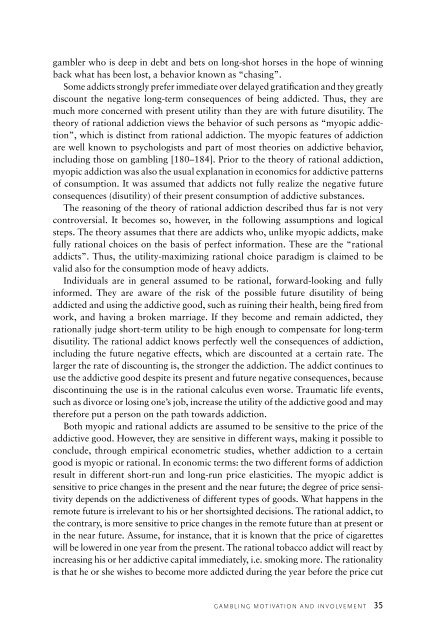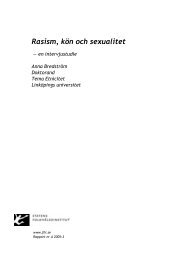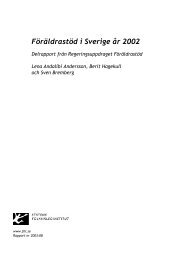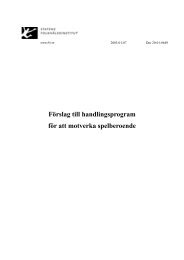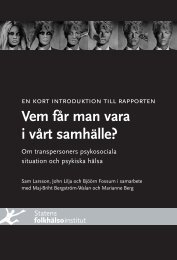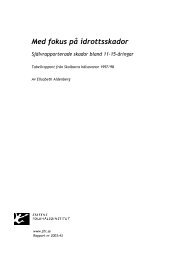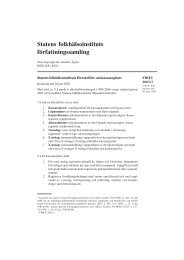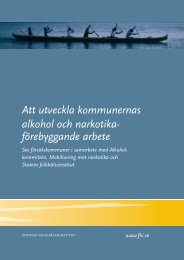Gambling motivation and involvement: A review of social
Gambling motivation and involvement: A review of social
Gambling motivation and involvement: A review of social
Create successful ePaper yourself
Turn your PDF publications into a flip-book with our unique Google optimized e-Paper software.
gambler who is deep in debt <strong>and</strong> bets on long-shot horses in the hope <strong>of</strong> winning<br />
back what has been lost, a behavior known as “chasing”.<br />
Some addicts strongly prefer immediate over delayed gratification <strong>and</strong> they greatly<br />
discount the negative long-term consequences <strong>of</strong> being addicted. Thus, they are<br />
much more concerned with present utility than they are with future disutility. The<br />
theory <strong>of</strong> rational addiction views the behavior <strong>of</strong> such persons as “myopic addiction”,<br />
which is distinct from rational addiction. The myopic features <strong>of</strong> addiction<br />
are well known to psychologists <strong>and</strong> part <strong>of</strong> most theories on addictive behavior,<br />
including those on gambling [180–184]. Prior to the theory <strong>of</strong> rational addiction,<br />
myopic addiction was also the usual explanation in economics for addictive patterns<br />
<strong>of</strong> consumption. It was assumed that addicts not fully realize the negative future<br />
consequences (disutility) <strong>of</strong> their present consumption <strong>of</strong> addictive substances.<br />
The reasoning <strong>of</strong> the theory <strong>of</strong> rational addiction described thus far is not very<br />
controversial. It becomes so, however, in the following assumptions <strong>and</strong> logical<br />
steps. The theory assumes that there are addicts who, unlike myopic addicts, make<br />
fully rational choices on the basis <strong>of</strong> perfect information. These are the “rational<br />
addicts”. Thus, the utility-maximizing rational choice paradigm is claimed to be<br />
valid also for the consumption mode <strong>of</strong> heavy addicts.<br />
Individuals are in general assumed to be rational, forward-looking <strong>and</strong> fully<br />
informed. They are aware <strong>of</strong> the risk <strong>of</strong> the possible future disutility <strong>of</strong> being<br />
addicted <strong>and</strong> using the addictive good, such as ruining their health, being fired from<br />
work, <strong>and</strong> having a broken marriage. If they become <strong>and</strong> remain addicted, they<br />
rationally judge short-term utility to be high enough to compensate for long-term<br />
disutility. The rational addict knows perfectly well the consequences <strong>of</strong> addiction,<br />
including the future negative effects, which are discounted at a certain rate. The<br />
larger the rate <strong>of</strong> discounting is, the stronger the addiction. The addict continues to<br />
use the addictive good despite its present <strong>and</strong> future negative consequences, because<br />
discontinuing the use is in the rational calculus even worse. Traumatic life events,<br />
such as divorce or losing one’s job, increase the utility <strong>of</strong> the addictive good <strong>and</strong> may<br />
therefore put a person on the path towards addiction.<br />
Both myopic <strong>and</strong> rational addicts are assumed to be sensitive to the price <strong>of</strong> the<br />
addictive good. However, they are sensitive in different ways, making it possible to<br />
conclude, through empirical econometric studies, whether addiction to a certain<br />
good is myopic or rational. In economic terms: the two different forms <strong>of</strong> addiction<br />
result in different short-run <strong>and</strong> long-run price elasticities. The myopic addict is<br />
sensitive to price changes in the present <strong>and</strong> the near future; the degree <strong>of</strong> price sensitivity<br />
depends on the addictiveness <strong>of</strong> different types <strong>of</strong> goods. What happens in the<br />
remote future is irrelevant to his or her shortsighted decisions. The rational addict, to<br />
the contrary, is more sensitive to price changes in the remote future than at present or<br />
in the near future. Assume, for instance, that it is known that the price <strong>of</strong> cigarettes<br />
will be lowered in one year from the present. The rational tobacco addict will react by<br />
increasing his or her addictive capital immediately, i.e. smoking more. The rationality<br />
is that he or she wishes to become more addicted during the year before the price cut<br />
G A M B L I N G M O T I VAT I O N A N D I N V O LV E M E N T 35


